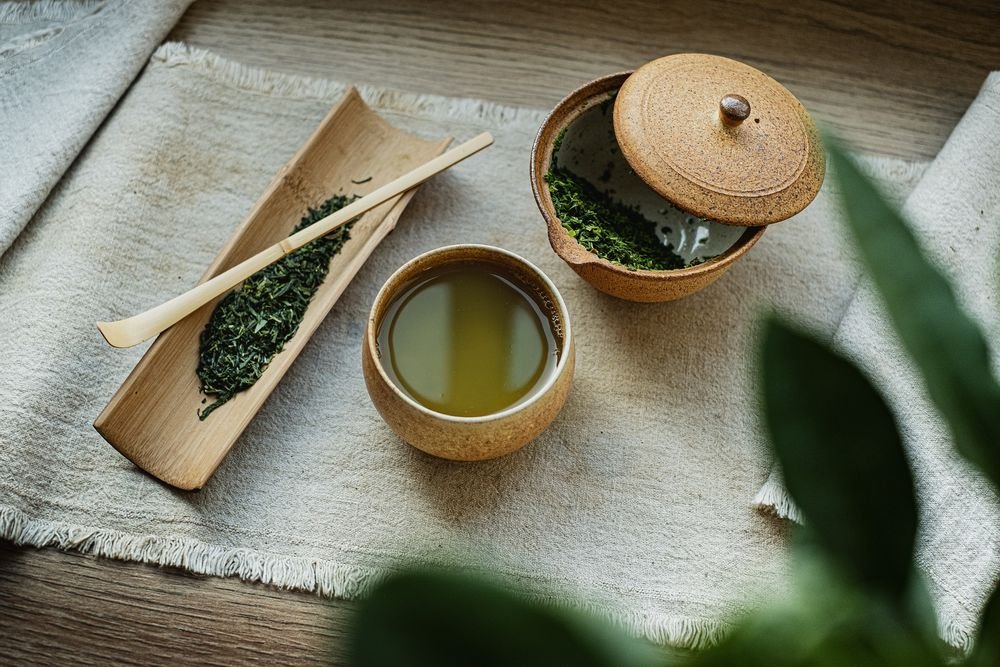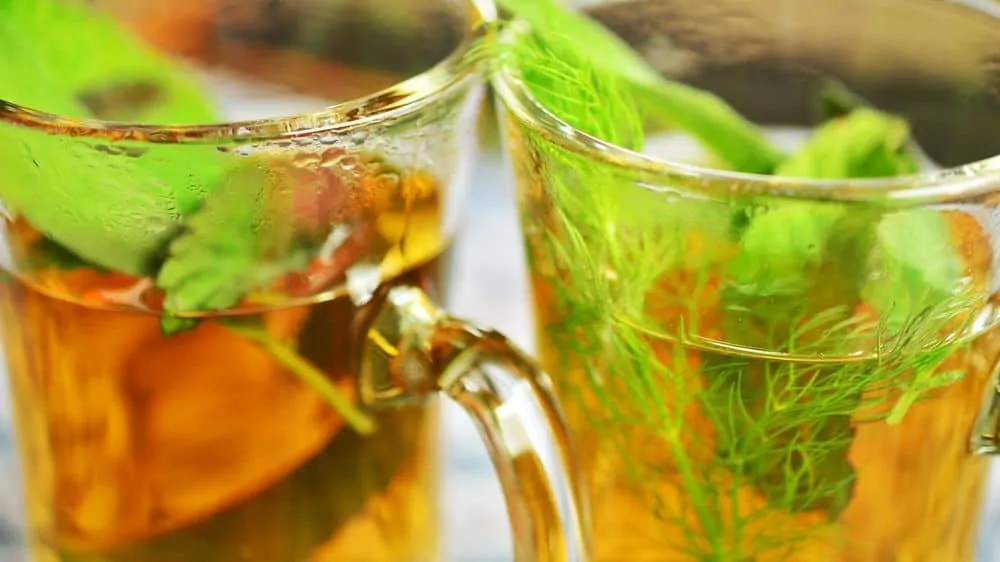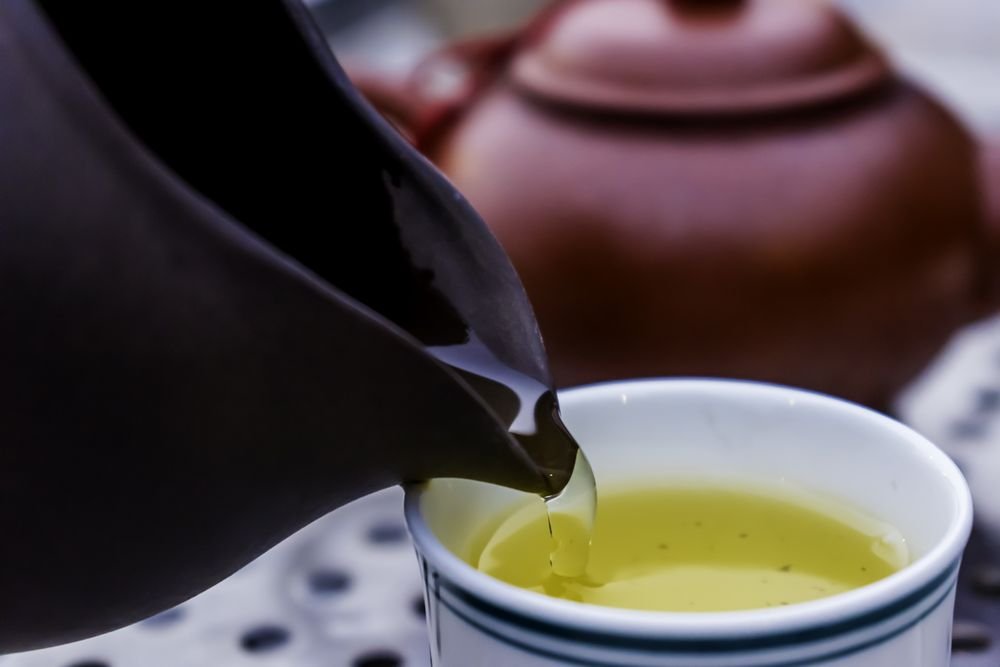 Mixed messages abound on this topic.
Mixed messages abound on this topic.
You may have heard that drinking green tea for acid reflux helps.
And you may have also heard that you should avoid green tea if you suffer from gastric issues.
So which is it?
Unfortunately, it is both. Yes, I know that does not clear anything up for you.
But the truth is that different people react differently to the caffeine and tannins in green tea.
For most, it does not help much, but it also does not hurt. For some, it can be a problem. Keep reading to learn everything you need to know about green tea and acid reflux. We will also cover other teas that are much more likely to help alleviate gastric issues
Table of Contents
Is Green Tea Good For Acid Reflux?
Green tea can help alleviate symptoms of acid reflux or other gastric issues, but there are far better teas for this. On the flip side, green tea usually does not cause acid reflux in most people, if drunk in moderation.
Green tea is a lot less acidic than black tea and coffee, but for some people, even its lower tannin and caffeine content could trigger acid reflux symptoms. But again, it does not cause problems for most.
And it can even help reduce the symptoms of acid reflux or other gastric issues for some. Here are the reasons green tea is not harmful for most, and can even help,in some cases.
Less Acidic Than Most Caffeinated Beverages

Compared to black coffee and black tea, green tea contains fewer tannins and caffeine, both of which are major triggers of acidity. This makes green tea in moderate quantities a great choice for most people with mild symptoms of acid reflux.
Rich in Antioxidants
Green tea contains antioxidants (catechins and polyphenols), which can help fight inflammation in the digestive tract. The anti-inflammatory properties of green tea could provide relief for people with gastric issues.
L-Theanine
Green tea contains an amino acid called L-theanine. Studies have shown that this unique, non-protein-forming amino acid can heal gastric ulcers and may be beneficial for people with gastric ulcer disease.
Promotes Digestion
A few studies have also shown that green tea increases beneficial gut bacteria and reduces harmful microbes. This can help soothe the stomach, reduce digestive issues like bloating and diarrhea, and also aid in overall digestive health.
Is Green Tea Good For GERD?

Green tea can help alleviate symptoms of GERD. However, it can also exacerbate them. It really depends on your sensitivity to the tannins and caffeine in green tea.
When you suffer from GERD (gastroesophageal reflux disease), your stomach acids flow back into the esophagus, resulting in discomfort, burning sensations in the chest and throat (heartburn), difficulty swallowing, and upper abdominal pain. Most people with GERD can safely drink moderate quantities of green. Here is why.
Lower Acidity
As explained above, green tea is a lot less acidic than most other caffeinated beverages. This makes it a suitable choice for GERD sufferers. However, depending on your symptoms and individual tolerance to green tea, you might still want to limit your green tea consumption.
Aids In Weight Loss

Studies show that green tea may aid in weight loss. This is important for GERD patients since excess weight tends to exacerbate the symptoms of this condition.
Lower Caffeine And Tannin Content
Green tea’s moderate to low caffeine and tannin contents can be beneficial for GERD in people who suffer from acidity due to these ingredients.
L-Theanine
Green tea’s L-theanine relaxes the esophageal sphincter to prevent symptoms like burning in the chest, burping, and upper abdominal pain.
Digestive Aid
Green tea contains compounds that stimulate digestive enzymes. This could be advantageous for individuals with GERD, because it helps support their delicate digestive system.
What Teas Are Best For Acid Reflux?

The following are some of the best teas for patients with GERD or acid reflux.
Ginger Tea
Ginger has been used for ages to combat stomach issues like indigestion. You can steep ginger root in hot water and drink it with a dash of honey to soothe the tummy and reduce symptoms of acidity. I like adding a bit of lemon to it, too.
Chamomile Tea
Chamomile tea is also naturally relaxing and known to relieve digestive issues. It reduces stress hormones, which often contribute to heartburn and other acid-reflux symptoms. Steep chamomile leaves and flowers in hot water for a few minutes. Drink after dinner.
Licorice Tea
Licorice root has been used traditionally to soothe digestive issues. The herb is also known to coat and protect the lining of the esophagus, which can benefit GERD patients.
Peppermint Tea
Peppermint calms the stomach muscles and improves the flow of bile. This helps digest fats and also speeds up the digestive processes. Peppermint tea also soothes an upset stomach. Steep dried or fresh peppermint leaves in hot water for 5-7 minutes. Strain and enjoy.
Fennel Tea

Fennel has been used as a digestive aid for long time. It is known to relax the muscles of the gastrointestinal tract. Fennel tea can be helpful in reducing symptoms of indigestion and acid reflux.
Green Tea
As mentioned earlier, green tea is a natural digestive aid. Its L-theanine amino acid also relaxes the esophageal sphincter to prevent acid reflux. Green tea also aids digestive health and reduces inflammation.
That said, it is not as good as the alternative teas above, due to its tannin and caffeine content, both of which can exacerbate acidity in sensitive individuals.
Acidity Of Green Tea

Green tea is a lot less acidic than black coffee and black tea. The pH of coffee ranges from 4.85 to 5.10, which makes it moderately acidic. Likewise, the pH of black tea ranges from 4.9 to 5.5, which also makes it moderately acidic.
The pH of green tea is between 7 and 10. This shows that green tea is neutral, or alkaline, and not acidic. Naturally, the exact pH value of tea and coffee depends on the type and how they are cultivated and processed.
It is also important to understand that individual tolerances for acidic beverages can vary greatly. Some people might find green tea acidic, while others may be able to tolerate its acidity slightly better than other caffeinated beverages.
When Should I Drink Green Tea To Avoid Acidity?
To avoid the acidity of green tea, try drinking it after a small meal instead of having it on an empty stomach. This can help minimize acidity, because food in the stomach helps buffer the acidity of the tea.
You must also be mindful of the ingredients you add to your green tea. Citrusy additions like lemon juice and acidic sweeteners could increase the overall acidity of your green tea.
You may also want to limit the amount of green tea you consume. Drink smaller quantities of green tea at a time to help reduce its overall acidity impact.
It is also important that you stay hydrated throughout the day. Drink several glasses of water between cups of green tea to neutralize acidity and support your overall digestive health.
Is It Okay to Drink Green Tea First Thing in The Morning?

Many people drink green tea first thing in the morning on an empty stomach to promote digestive health and aid detoxification.
That is not the best thing to do. After several hours of fasting, it is better to have a light meal instead of green tea.
Green tea contains compounds that increase digestive enzymes. These could trigger acid reflux and nausea in some people. Therefore, the best time to have green tea is in the morning after breakfast or an hour or two after lunch in the afternoon.
Green Tea Acid Reflux: Final Thoughts
Drinking green tea for acid reflux is not the best option. There are better teas to help alleviate the symptoms of GERD or other gastric issues, specifically the ones listed above.
That said, green tea may help a little for some people. For most it won’t do much of anything. For those who are more sensitive to tannins and caffeine, even the small amounts in green tea may exacerbate symptoms of acid reflux.
Leave a Reply